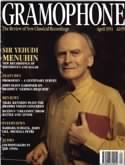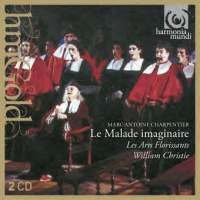Texte paru dans: / Appeared in:
|
|
|
Outil de traduction (Très approximatif) |
|
|
Reviewer: Nicholas Anderson
N.B. :The initial version issued by Harmonia Mundi in 1990 was only 78:56
minutes long. The HM Gold version released in 2012 brings us in its entirety
the original production. It now runs for 1h30.
As the Charpentier scholar, H . Wiley Hitchcock, remarks in his essay accompanying Christie 's version, the musical history of Le malade imaginaire is not a simple one. Lully's various ordinances obliged Charpentier not once, but at least three times, to revise his score, paring i t down on each subsequent occasion to meet the ever more outrageous demands of Lully's "dictature musicale". From a mass of surviving material Hitchcock prepared a critical edition which provides the basis of Christie's performance. More recently, however, as I remarked in my review of Minkowski's version, another American scholar, John S. Powell, discovered an eighteenth-century copy of the missing music of the first inlermede and of the petit opera impromptu. Since both of these are included in Christie's performance the Harmonia Mundi recording must be regarded as the more complete of the two.
Having said that much I shall quickly add that no one already in possession of Minkowski's version should feel unduly cheated. His cast of singers is excellent with fine contributions from the sopranos Guillemette Laurens, Isabelle Poulenard and Jill Feldman and the haute-contre Gilles Ragon. I found Christie's team more variable . His sopranos, on this occasion, lack some of the radiance imparted by the others though there is a strong contribution from Howard Crook and an inimitable one from Dominique Visse as the old woman at the beginning of the Premier inlermede. Christie's troupe, doubtless benefiting from several acclaimed stage performances of the complete play at the Chatelet in Paris last year, is often more fluent and unbuttoned than the other and there is understandably a more vivid sense of mise en scene. On the other hand I sometimes preferred the incisive, sharply focused playing of Les Musiciens du Louvre and their more courtly sense of gesture; and Minkowski 's assembled voices come across more effectively than the larger chorus of Les Arts Florissants - presumably the latter was mustered for the stage performances, though Charpentier is unlikely to have had recourse to such numbers as these.
As by now you will have judged , there is not much to choose between the two versions . Both are entertaining and stylishly realized . Those readers already in possession of the Erato performance can rest content, unless that is they feel a burning need for the missing items included in the other. The petit opera impromptu is charmingly done with just the right degree of inexperience and naivety , but it is not vintage Charpentier. Of greater musical interest, perhaps, are the two Italian airs in the Premier inlermede whose absence from Minkowski's version I regretted rather more than the omission of the impromptu opera . A difficult decision…
|
|
|
|
|
|
Cliquez l'un ou l'autre
bouton pour découvrir bien d'autres critiques de CD |
|




